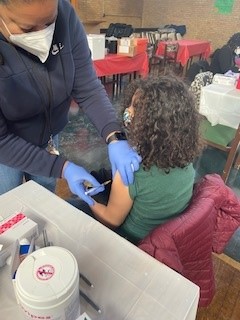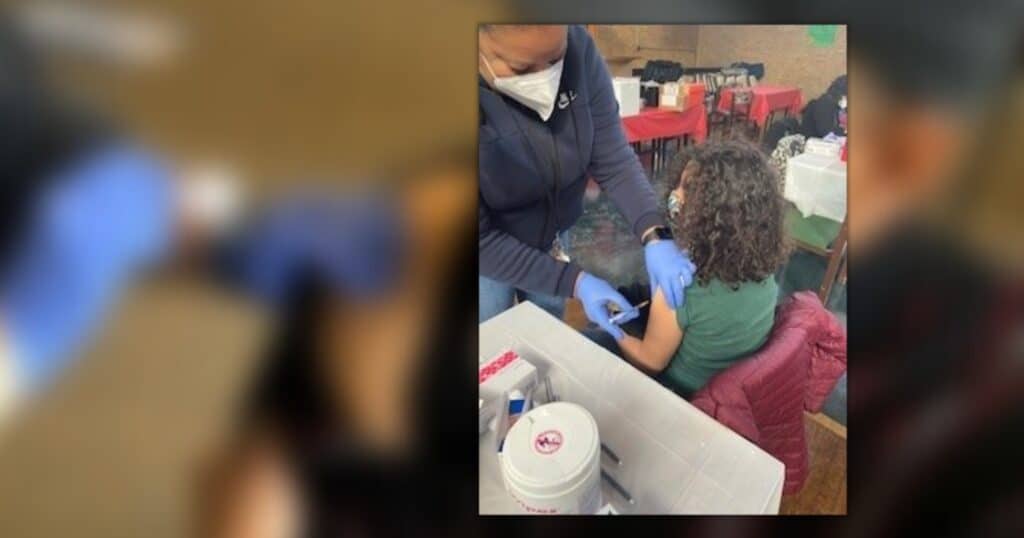With COVID — and myths — still a reality, churches pay people cash to get shots
Seven Greater Cleveland churches may be the only ones anywhere that pay people cash to get immunized.
More than a dozen congregations in and around Cleveland are giving $100 to anyone who shows up to get a COVID-19 vaccine shot.
That’s for a first dose. A second dose pays $50; a booster, $25. People also get $25 if they bring a friend.

People are still dying of the coronavirus, even as the pandemic wanes in many parts of the U.S. As of mid-March, for example, Ohio had seen 7,213 reported COVID cases, 376 hospitalizations and 81 deaths (through March 17). In that same period, the county that includes Cleveland had 704 cases, 43 hospitalizations and two deaths.
“So we must be wise,” said the Rev. Michele Teague-Humphrey, senior pastor of Imani United Church of Christ in Euclid. It’s one of the congregations taking a turn hosting “Dollars for Doses” clinics. Besides the ongoing threat from existing strains of COVID, another variant could strike without warning, she said. “We really do not know.”
That unknown — and what people of Imani do know from the pandemic — is why the church signed up as a paying vaccine site.
Countering falsehoods
The program, run by an interfaith organization, Greater Cleveland Congregations, started in February and takes place on selected Saturdays through Sept. 24. Five Baptist and two UCC churches are the sites. Imani’s clinic will be April 2. South Euclid UCC‘s will be on Sept. 10.
One of Imani’s motivations, Teague-Humphrey said, was “just being an African American congregation and seeing the number of people who were impacted by COVID — not only in our congregation but in our community.” She said Imani alone had “members hospitalized, members placed on ventilators” and four deaths since COVID’s onset in 2020.
In Euclid, east of Cleveland, “there were those who readily embraced getting vaccinated because they knew they were at risk or didn’t want to put family members at risk,” Teague-Humphrey said. But even they — especially early in the pandemic — sometimes found it hard to get to the chain pharmacies that were offering COVID shots.
But there were, and still are, vaccine skeptics, too. “Not knowing what’s in the vaccine” is one reason Teague-Humphrey has heard them give. And misinformation in broadcasts and online — even from religious sources — hasn’t helped. “There are those who are teaching that the vaccine is the mark of the beast,” she said.
Teague-Humphrey said multiple approaches are needed to dispel those myths. “My husband and I were vaccinated and shared that from the pulpit,” she said. She has made public appearances — in a COVID panel discussion sponsored by GCC, for instance — and in private conversations. “I try to talk about the idea of loving your neighbor. It’s not just about you. It’s about protecting those around you.”
‘Trusted institutions’
Those efforts, especially by churches, can make a difference, said GCC Executive Director Keisha Krumm. She called the seven churches serving as Dollars for Doses sites “trusted institutions in their neighborhoods.” The first two clinics in the series — on Feb. 19 and March 5 — vaccinated 377 people, she said. “Sixty-eight percent of the people coming in are getting their first shot.”
Krumm said GCC is funding the program with a $50,000 grant from the Funders Collaborative on COVID Recovery of the Cleveland Foundation, plus $25,000 left over from past grants. She’s looking to raise more money, too, because early turnout has been higher than expected.
GCC ran a much smaller version of the program in the summer of 2021, with a pool of $5,000 from four churches — including Imani. Various organizations around the country have offered other kinds of incentives to get people to take COVID shots: lottery tickets, drawings for scholarships, fishing or hunting licenses, Girl Scout cookies, even free drinks. But Krumm said she was unaware of any other churches offering cash.
Teague-Humphrey said she favors “whatever means we can use to really encourage people to become vaccinated.”
“This COVID – it impacts all of us,” she said. “It doesn’t care about race, religion, economic status. We must all do our part.”
Content on ucc.org is copyrighted by the National Setting of the United Church of Christ and may be only shared according to the guidelines outlined here.
Related News
A Prophetic Call for Justice and Peace in Palestine
The executive leaders of the United Church of Christ have issued the following statement...
Read More‘Love is Greater Than Fear’: Regional Youth Events get to the heart of gospel message
United Church of Christ teens attending this summer’s Regional Youth Events (RYE) are...
Read MoreUCC desk calendars available to order now
Prepare for your day, month and year with the United Church of Christ desk calendar —...
Read More


